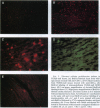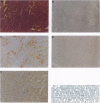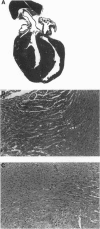Abstract
Transforming growth factor beta 1 (TGF beta 1)-null mice die fro complications due to an early-onset multifocal inflammatory disorder. We show here that cardiac cells are hyperproliferative and that intercellular adhesion molecule 1 (ICAM-1) is elevated. To determine which phenotypes are primarily caused by a deficiency in TGF beta 1 from those that are secondary to inflammation, we applied immunosuppressive therapy and genetic combination with the severe combined immunodeficiency (SCID) mutation to inhibit the inflammatory response. Treatment with antibodies to the leukocyte function-associated antigen 1 doubled longevity, reduced inflammation, and delayed heart cell proliferation. TGF beta 1-null SCID mice displayed no inflammation or cardiac cell proliferation, survived to adulthood, and exhibited normal major histocompatibility complex II (MHC II) and ICAM-1 levels. TGF beta 1-null pups born to a TGF beta 1-null SCID mother presented no gross congenital heart defects, indicating that TGF beta 1 alone does not play an essential role in heart development. These results indicate that lymphocytes are essential for the inflammatory response, cardiac cell proliferation, and elevated MHC II and ICAM-1 expression, revealing a vital role for TGF beta 1 in regulating lymphocyte proliferation and activation, which contribute to the maintenance of self tolerance.
Full text
PDF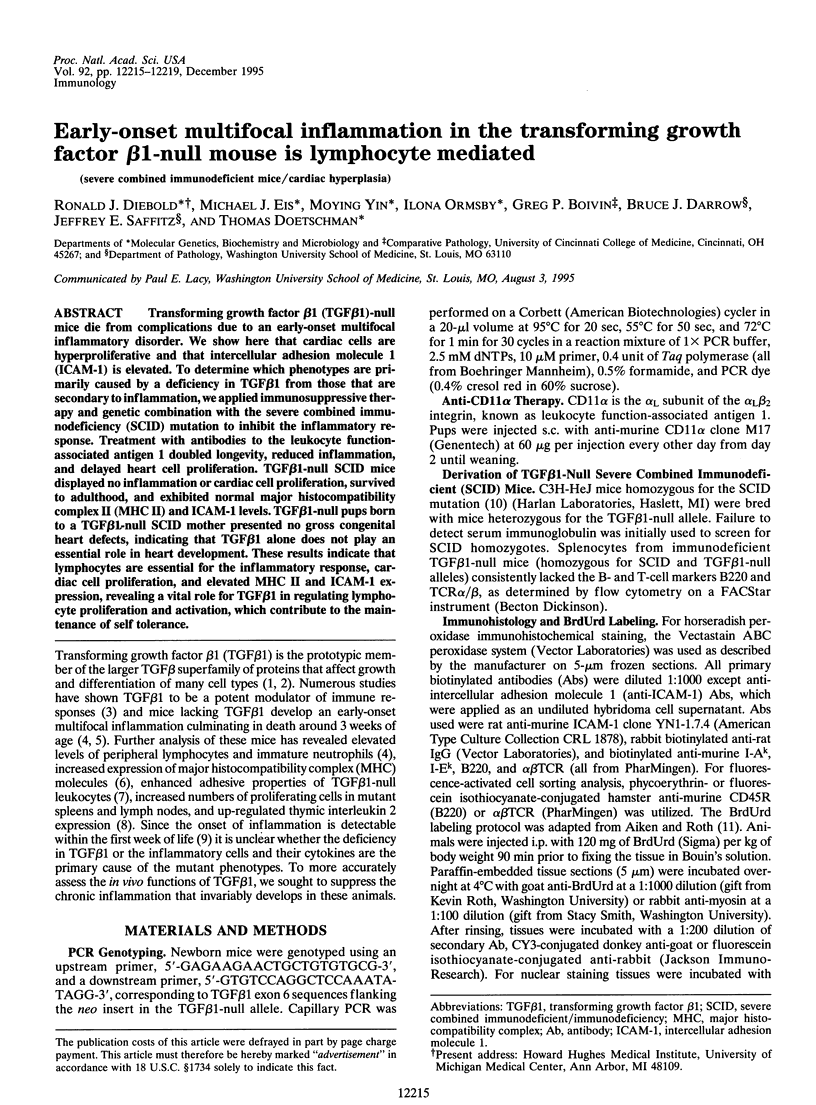
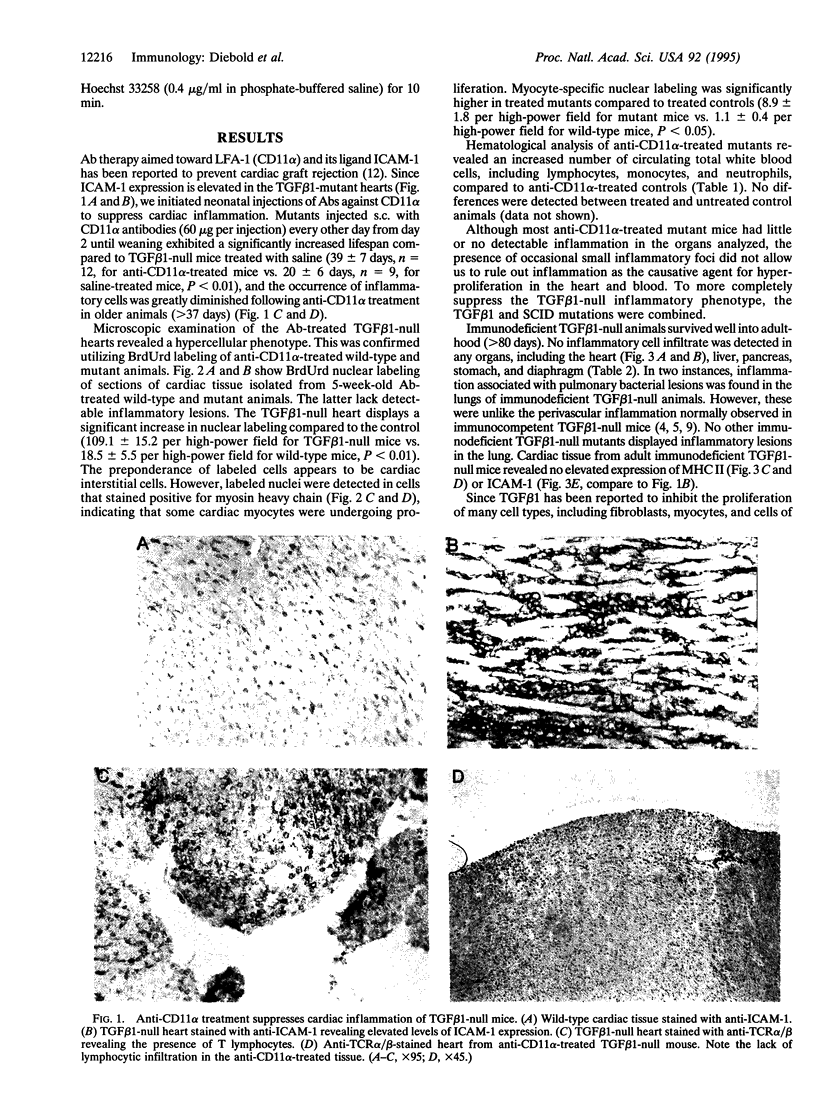
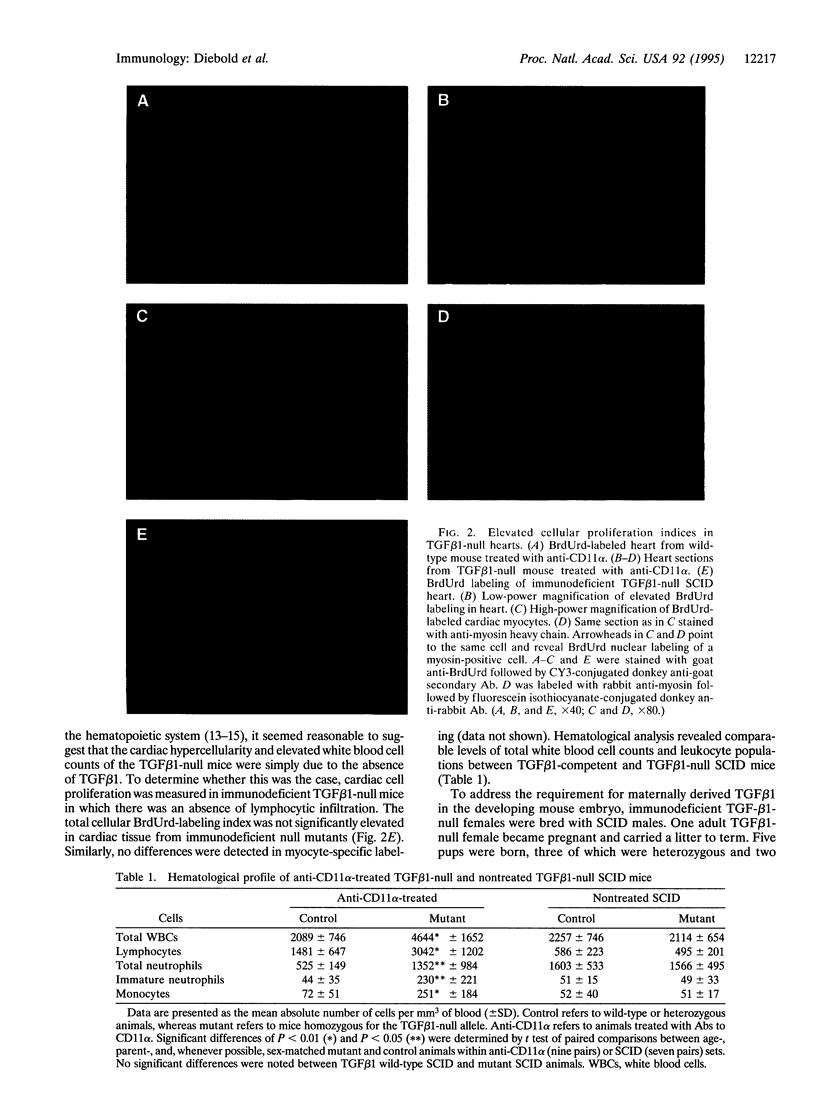
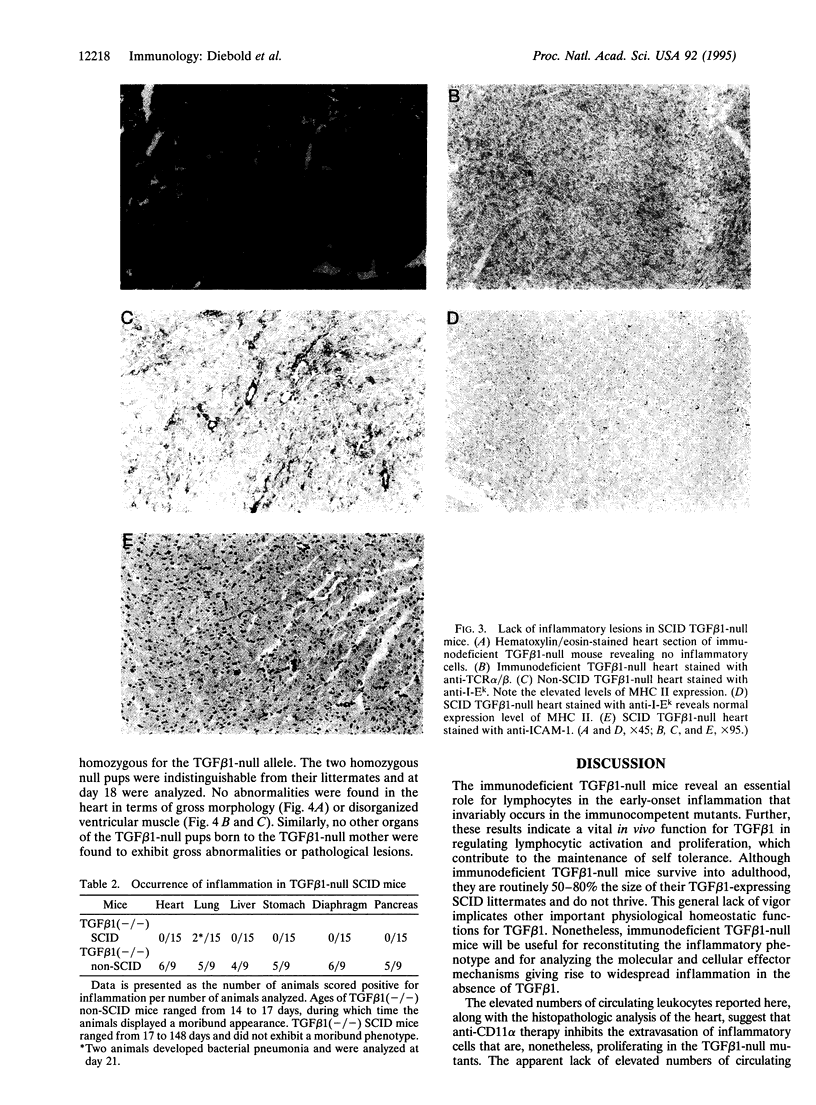
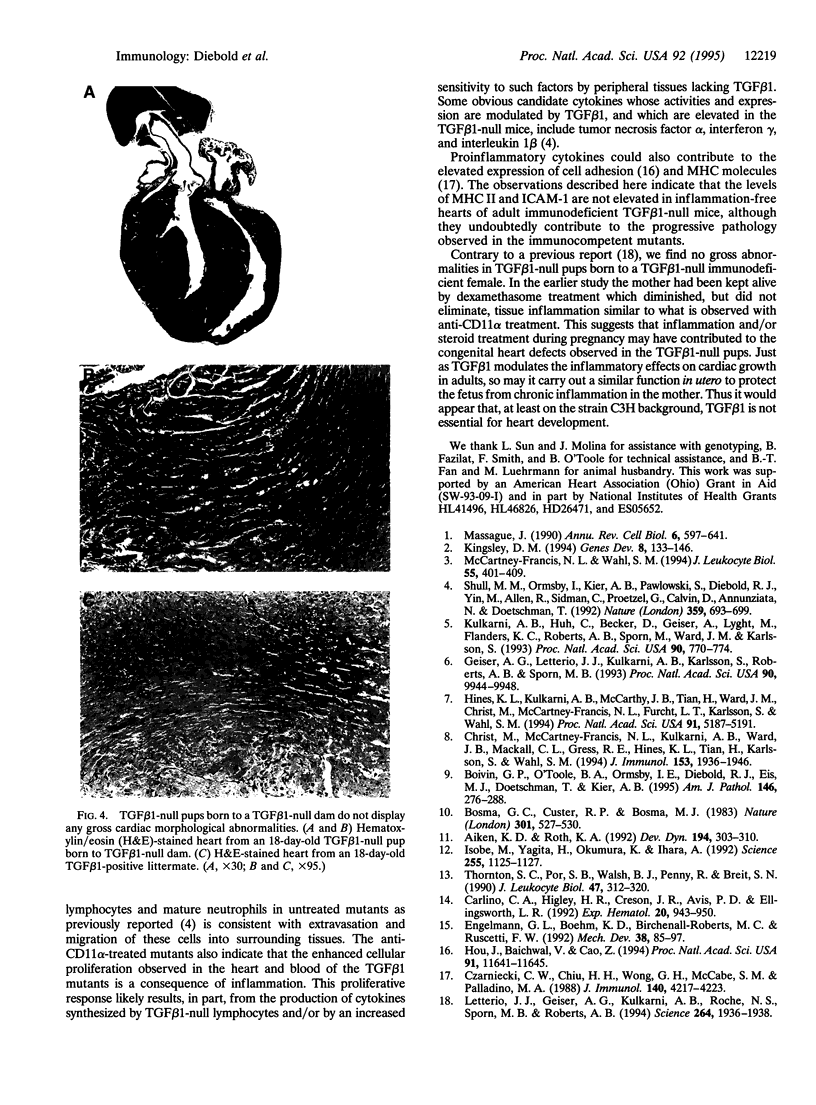
Images in this article
Selected References
These references are in PubMed. This may not be the complete list of references from this article.
- Aiken K. D., Roth K. A. Temporal differentiation and migration of substance P, serotonin, and secretin immunoreactive enteroendocrine cells in the mouse proximal small intestine. Dev Dyn. 1992 Aug;194(4):303–310. doi: 10.1002/aja.1001940406. [DOI] [PubMed] [Google Scholar]
- Boivin G. P., O'Toole B. A., Orsmby I. E., Diebold R. J., Eis M. J., Doetschman T., Kier A. B. Onset and progression of pathological lesions in transforming growth factor-beta 1-deficient mice. Am J Pathol. 1995 Jan;146(1):276–288. [PMC free article] [PubMed] [Google Scholar]
- Bosma G. C., Custer R. P., Bosma M. J. A severe combined immunodeficiency mutation in the mouse. Nature. 1983 Feb 10;301(5900):527–530. doi: 10.1038/301527a0. [DOI] [PubMed] [Google Scholar]
- Carlino J. A., Higley H. R., Creson J. R., Avis P. D., Ogawa Y., Ellingsworth L. R. Transforming growth factor beta 1 systemically modulates granuloid, erythroid, lymphoid, and thrombocytic cells in mice. Exp Hematol. 1992 Sep;20(8):943–950. [PubMed] [Google Scholar]
- Christ M., McCartney-Francis N. L., Kulkarni A. B., Ward J. M., Mizel D. E., Mackall C. L., Gress R. E., Hines K. L., Tian H., Karlsson S. Immune dysregulation in TGF-beta 1-deficient mice. J Immunol. 1994 Sep 1;153(5):1936–1946. [PubMed] [Google Scholar]
- Czarniecki C. W., Chiu H. H., Wong G. H., McCabe S. M., Palladino M. A. Transforming growth factor-beta 1 modulates the expression of class II histocompatibility antigens on human cells. J Immunol. 1988 Jun 15;140(12):4217–4223. [PubMed] [Google Scholar]
- Engelmann G. L., Boehm K. D., Birchenall-Roberts M. C., Ruscetti F. W. Transforming growth factor-beta 1 in heart development. Mech Dev. 1992 Aug;38(2):85–97. doi: 10.1016/0925-4773(92)90001-z. [DOI] [PubMed] [Google Scholar]
- Geiser A. G., Letterio J. J., Kulkarni A. B., Karlsson S., Roberts A. B., Sporn M. B. Transforming growth factor beta 1 (TGF-beta 1) controls expression of major histocompatibility genes in the postnatal mouse: aberrant histocompatibility antigen expression in the pathogenesis of the TGF-beta 1 null mouse phenotype. Proc Natl Acad Sci U S A. 1993 Nov 1;90(21):9944–9948. doi: 10.1073/pnas.90.21.9944. [DOI] [PMC free article] [PubMed] [Google Scholar]
- Hines K. L., Kulkarni A. B., McCarthy J. B., Tian H., Ward J. M., Christ M., McCartney-Francis N. L., Furcht L. T., Karlsson S., Wahl S. M. Synthetic fibronectin peptides interrupt inflammatory cell infiltration in transforming growth factor beta 1 knockout mice. Proc Natl Acad Sci U S A. 1994 May 24;91(11):5187–5191. doi: 10.1073/pnas.91.11.5187. [DOI] [PMC free article] [PubMed] [Google Scholar]
- Hou J., Baichwal V., Cao Z. Regulatory elements and transcription factors controlling basal and cytokine-induced expression of the gene encoding intercellular adhesion molecule 1. Proc Natl Acad Sci U S A. 1994 Nov 22;91(24):11641–11645. doi: 10.1073/pnas.91.24.11641. [DOI] [PMC free article] [PubMed] [Google Scholar]
- Isobe M., Yagita H., Okumura K., Ihara A. Specific acceptance of cardiac allograft after treatment with antibodies to ICAM-1 and LFA-1. Science. 1992 Feb 28;255(5048):1125–1127. doi: 10.1126/science.1347662. [DOI] [PubMed] [Google Scholar]
- Kingsley D. M. The TGF-beta superfamily: new members, new receptors, and new genetic tests of function in different organisms. Genes Dev. 1994 Jan;8(2):133–146. doi: 10.1101/gad.8.2.133. [DOI] [PubMed] [Google Scholar]
- Kulkarni A. B., Huh C. G., Becker D., Geiser A., Lyght M., Flanders K. C., Roberts A. B., Sporn M. B., Ward J. M., Karlsson S. Transforming growth factor beta 1 null mutation in mice causes excessive inflammatory response and early death. Proc Natl Acad Sci U S A. 1993 Jan 15;90(2):770–774. doi: 10.1073/pnas.90.2.770. [DOI] [PMC free article] [PubMed] [Google Scholar]
- Letterio J. J., Geiser A. G., Kulkarni A. B., Roche N. S., Sporn M. B., Roberts A. B. Maternal rescue of transforming growth factor-beta 1 null mice. Science. 1994 Jun 24;264(5167):1936–1938. doi: 10.1126/science.8009224. [DOI] [PubMed] [Google Scholar]
- Massagué J. The transforming growth factor-beta family. Annu Rev Cell Biol. 1990;6:597–641. doi: 10.1146/annurev.cb.06.110190.003121. [DOI] [PubMed] [Google Scholar]
- McCartney-Francis N. L., Wahl S. M. Transforming growth factor beta: a matter of life and death. J Leukoc Biol. 1994 Mar;55(3):401–409. doi: 10.1002/jlb.55.3.401. [DOI] [PubMed] [Google Scholar]
- Shull M. M., Ormsby I., Kier A. B., Pawlowski S., Diebold R. J., Yin M., Allen R., Sidman C., Proetzel G., Calvin D. Targeted disruption of the mouse transforming growth factor-beta 1 gene results in multifocal inflammatory disease. Nature. 1992 Oct 22;359(6397):693–699. doi: 10.1038/359693a0. [DOI] [PMC free article] [PubMed] [Google Scholar]
- Thornton S. C., Por S. B., Walsh B. J., Penny R., Breit S. N. Interaction of immune and connective tissue cells: I. The effect of lymphokines and monokines on fibroblast growth. J Leukoc Biol. 1990 Apr;47(4):312–320. doi: 10.1002/jlb.47.4.312. [DOI] [PubMed] [Google Scholar]





